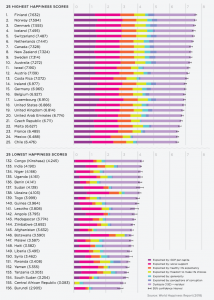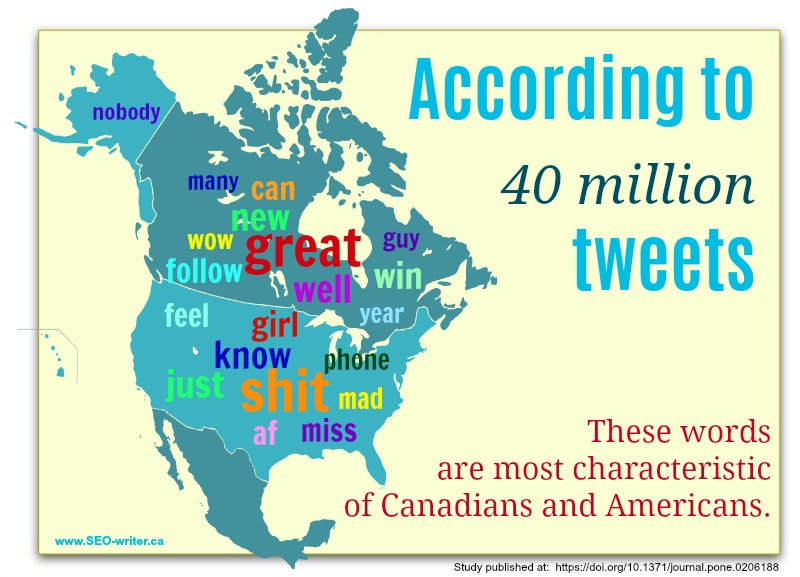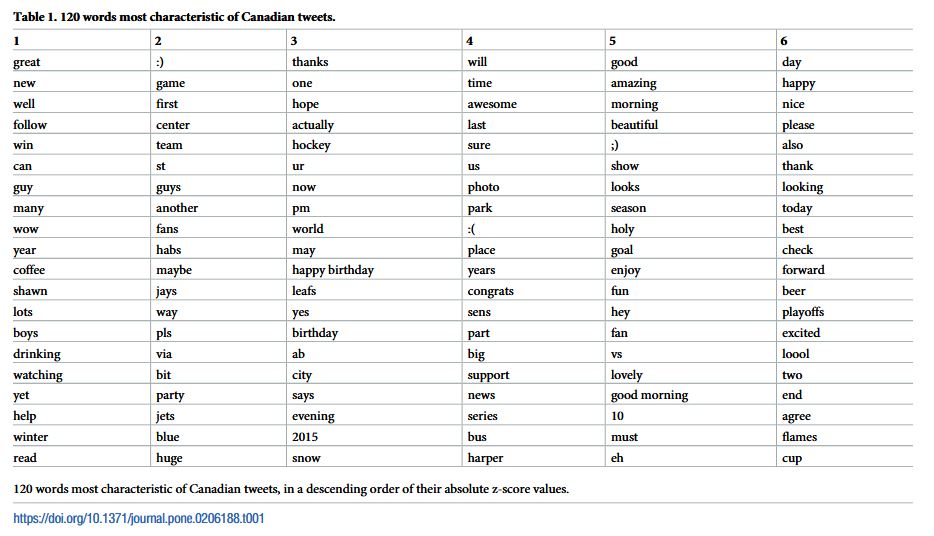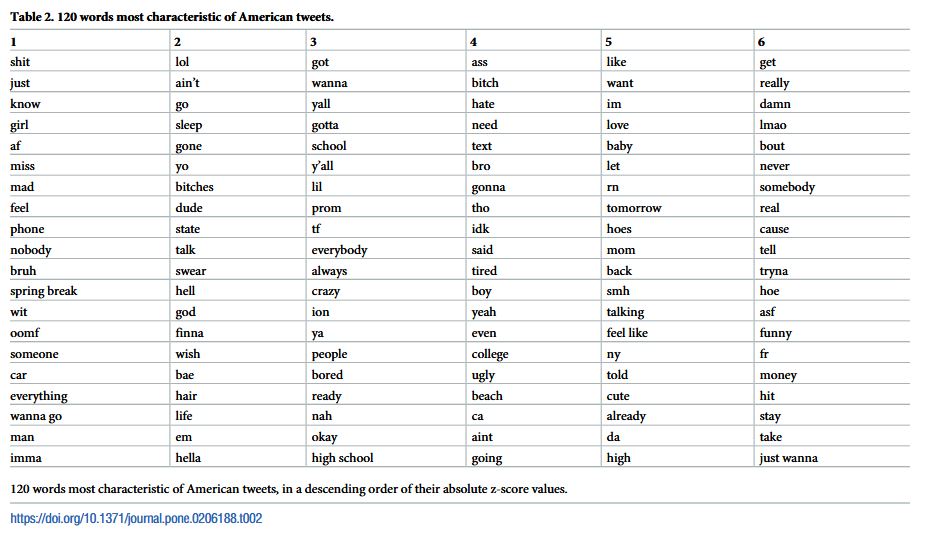How important is our choice of words? Let’s see what Twitter says. A study of 40 million tweets reveals the true nature of being a “nicer” Canadian.
Be careful about the words you use. Those words tell a lot about you. But it’s not just about you, the individual. Words can tell a lot about national character, as well.
Canadians often take great pride in being “nice”, especially in contrast to our American neighbours (who presumably are “less nice”?).
But is our self-perception true? Or is it just fake news?
Bryor Snefjella, Daniel Schmidtke and Victor Kuperman decided to put that question to the test. They decided to compare the language Canadians and Americans use, to see what that tells about our collective character.
The researchers took to Twitter and analyzed 40 million tweets to see how well stereotypes of Americans and Canadians stood up to reality.
The important role that – gasp! – stereotypes play
Before looking at what they found, let’s take a moment to consider what a stereotype is. The very idea of stereotypes is not popular these days. The problem is that not everybody fits the stereotype. There is a huge difference between the “typical” Canadian and me. Or than you. Or than Mrs. Bradley down the street.
However, most stereotypes have a basis in reality. We use stereotypes to make sense of our world without having to evaluate every person we meet. We would exhaust ourselves trying. And marketing campaigns cannot be designed around each individual, so they have to seek some overall national character traits.
In the same way, each of us tweets differently. But a sample size of 40 million tweets can tell us what typical Canadian and American language says about typical Canadians and Americans.
So what do all those tweets say?
What Canadians reveal about themselves on Twitter
Let’s cut the suspense. They don’t actually say that Canadians are nicer, despite several online interpretations. They do say that Canadians are happier.
As one might expect, the language of Canadians and Americans was not all that different. What the study looked at were the words that appeared significantly more often in tweets from one country or the other. Words that were used to a similar degree were removed. This study was not intended to measure how different or how similar people are in the two countries. It was intended to measure in what way they are different.
The researchers also removed tweets that looked like bots or were commercial in nature. Only accounts with less than one link per tweet were studied, for instance.
Canadian tweets tended to have more of these words:
- great
- new
- well
- follow
- win
- can
- guy
- many
- wow
- year
These were the top 10 most characteristically Canadian words, meaning that they were used much more by Canadians than by Americans. In 12th place was “Shawn”, by the way. Yeah, I’m scratching my head about that one, too.
In contrast, the most characteristically American words were:
- shit
- just
- know
- girl
- af
- miss
- mad
- feel
- phone
- nobody
If you, like me, were wondering what the “af” stands for, there are plenty of answers here.
Here are the full tables from the study (click to enlarge).
The report draws some interesting comparisons:
While a comprehensive linguistic analysis of dialectal differences between Canada and the US is a subject of future research, we highlight cross-linguistic patterns relevant for our study. One distinguishing feature of American lexical choices relative to Canadian is an over-representation of several types of non-standard language. For instance, American tweets tend to use slang, primarily netspeak (i.e., specialized slang developed for electronic communication): lol [laughing out loud], lmao [laughing my ass off], as well as af [as f*ck], rn [right now], tf [the f*ck], idk [I don’t know], ion [I don’t]. Canadians more often used forms like ur [your] and pls [please]. Similarly, American tweets contain a substantially greater number of dialectal forms: e.g., ain’t, wanna, yall, bout, yo, y’all, bro, lil, gonna, bruh, tryna, finna, and hella. Some of these forms tend to be relatively localized (e.g., yall, y’all and ion are mostly found in Southeastern states), while others (bro, lil) show a broader geographic spread over the US in our data, with a preferential occurrence in large metropolitan areas. Also, there is a relative abundance of emojis (pictographs conveying emotional states) in the American data (e.g.,
,
), while Canadians favor a small number of emoticons, such as :), ;), and :(. Conversely, no emoticons are found among very American outputs, and only few emojis (“purple heart”
and “maple leaf”
) are found among Canadian outputs. A preference of emojis over emoticons or vice versa is in line with the findings of [“More emojis, less:) The competition for paralinguistic function in microblog writing”], who report an increase in the use of emojis to correlate with a decrease in the use of all other non-standard forms, including emoticons. Finally, American lexical choices show a clear relative preference for taboo words, including swear words, expletives, and racial slurs (e.g., f*ck, sh*t, ass, hoe, b*tch, n*gga).
The researchers, as is often done in such studies, summarize the information already available from previous studies. They tell us that Canadians and Americans are not all that different. In fact, our personality types “cluster together” in most global studies.
However, when Canadians and Americans are asked to self-evaluate or to evaluate each other, we paint different pictures. Canadians are generally deemed to be more “conscientious” and more “agreeable”. Americans are generally deemed to be more “neurotic”, which I meant as a psychological term, rather than throwing shade.
So…are Canadians nicer than Americans?
According to Daniel Schmidtke, co-author of the study and a post-doctoral researcher at McMaster University in Hamilton:
“The most distinctive word choices of Americans and Canadians on Twitter paint a very accurate and familiar picture of the stereotypes we associate with people from these nations.”
 The study authors point out that their findings do not show that Canadians are nicer. But the results do show that Canadians are happier than Americans. This aligns with various reports on world happiness, where Canada typically places in the top 10, along with other northern, frigid countries. You can draw your own conclusions from that!
The study authors point out that their findings do not show that Canadians are nicer. But the results do show that Canadians are happier than Americans. This aligns with various reports on world happiness, where Canada typically places in the top 10, along with other northern, frigid countries. You can draw your own conclusions from that!
Click on the image to the right to see the full-size image of happiest and least happy countries, courtesy of Visual Capitalist
According to Bryor Snefjella, the lead author of the US-Canadian tweets study and graduate student in linguistics and languages at McMaster:
“It’s tempting to think that Canadians tweet more nicely than Americans because they really are more nice than Americans. But when we put all the data together, it suggests that something more complicated is happening.”
What it does show, is that it’s worth hiring a Canadian writer if you want to communicate with Canadians. A Canadian writer will instinctively use words that Canadians identify with…because there are differences.
So, are Canadians nicer than Americans? It would be nice to think so. But our tweets tell us only that we are happier. And that’s pretty nice, too.












Yeah, this is the widely accepted perception of Canadians all around the world. I mean just look at tv shows where Canadians are depicted to be super nice and humble.